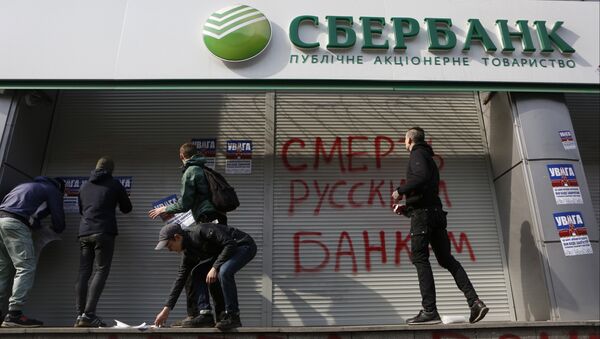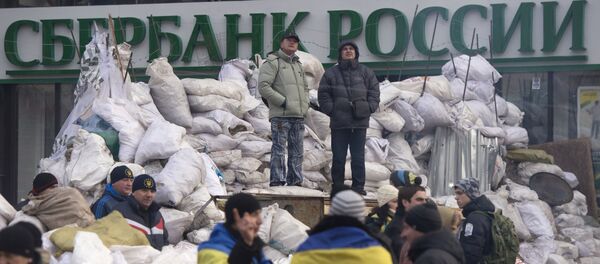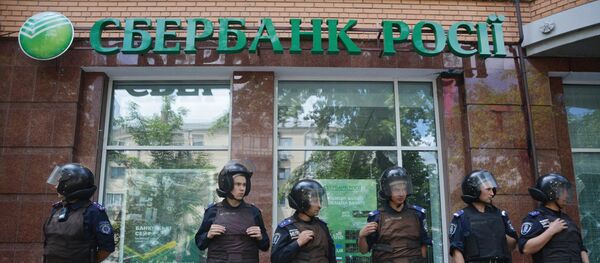The newspaper added that Sberbank has been negotiating with these investors since late 2016. Initially, a higher price was announced but it has been affected by the year of sanctions from Kiev and the blocking of its offices by radical activists.
Sberbank expects to close the deal in the first half of 2017, after it is approved by Ukrainian and Latvian financial authorities.
Currently, the Ukrainian subsidiary of Sberbank is the country’s sixth-largest bank, holding some $2.2 billion in assets and running a network of over 150 offices. The bank has nearly one million customers across Ukraine. By the end of the third quarter of 2016, however, the Ukrainian subsidiary accounted for less than 0.5 percent of Sberbank’s total assets.
The Kremlin said that Sberbank was finalizing its decision to the leave the Ukrainian market, adding that Moscow was concerned about the situation in Ukraine, including radicals blocking Russian banks and companies.
Kremlin spokesperson Dmitry Peskov said: "In this case, it is hardly possible to talk at all about any investment climate or the investment reliability of the country. It is obvious that this is a country with zero investment reliability after what has happened."
Sold in Six Days
Last year, Sberbank’s CEO Herman Gref said that the bank would not leave the Ukrainian market despite losses. In early March, however, Gref said that Sberbank would decide on its future in Ukraine by the end of 2017. After Kiev imposed sanctions against Russian state-owned banks, Gref said the bank was looking for options to quickly leave the Ukrainian market. A decision was found in six days.
In mid-March, Ukrainian President Petro Poroshenko approved a proposal from the Ukrainian National Security and Defense Council to introduce one-year-long sanctions on subsidiaries of five Russian state banks, including Sberbank and VTB.
The sanctions came amid large-scale protests by Ukrainian radicals against Russian banks. In particular, in early-March five Sberbank offices were blocked across Ukraine, including in Kiev. After the deal was announced, the blockade was lifted.
'Financial Dignity'
Experts reached by Sputnik said that the move is positive both for the Russian banks and the Ukrainian banking system. On the one hand, it will help Sberbank minimize reputational and financial losses. On the other hand, it will let the bank restore normal operations, which is positive for Ukraine’s financial sector.
"The fact that the bank is not leaving the market but will change the owner is positive for Ukraine’s banking sector because there will be not be such a major loss," prominent Ukrainian economist Alexei Plotnikov told Sputnik.
"The deal will allow [the bank to] leave the Ukrainian market with dignity, including financial dignity," he said.
According to Shokhin, it is very important for Kiev to regard the deal as an attempt to ease the tensions.
"I guess that even those radicals realized that their actions are harmful to Ukrainians, and there could be a way out of this situation," he added.
By dumping its assets in Ukraine, Sberbank will shrug off additional reputational risks, according to Stanislav Volkov, managing director for banking ratings at Expert RA, a rating agency.
He added that due to the sanctions, Sberbank was not interested in developing its Ukrainian subsidiary.
What is at Stake
He added that taking into account the sanctions and the urgency of the deal, the final sum is likely to be much lower.
According to Expert RA’s estimates, the deal may not have been completely market-conscious and the price is unlikely to be more than 50 percent of the subsidiary’s own capital.
Commenting on the deal, Andrei Kostin, CEO of Russian bank VTB, said that any such deal in Ukraine will have a discount.
In turn, Sberbank said that the sale of its Ukrainian subsidiary would not have a visible impact on bank’s financial reporting. According to Fitch, the deal will not affect Sberbank’s ratings. S&P also said that the deal will not significantly affect the Russian bank.
Never miss a story again — sign up to our Telegram channel and we'll keep you up to speed!







